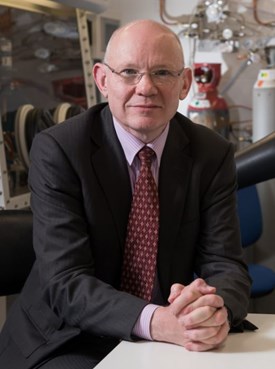Peter Bruce facts for kids
Quick facts for kids
Peter Bruce
FRS FRSE FRSC
|
|
|---|---|
 |
|
| Born |
Peter George Bruce
2 October 1956 |
| Alma mater | University of Aberdeen (BSc, PhD) |
| Known for | Lithium–air battery |
| Awards |
|
| Scientific career | |
| Institutions | |
| Thesis | Lithium ion conducting solid electrolytes (1981) |
Sir Peter George Bruce is a very important British chemist. He is a professor at the University of Oxford, where he studies different materials. From 2018 to 2023, he was a top leader at the Royal Society, a famous science group. Sir Peter also helped start the Faraday Institution, which works on energy storage.
Contents
Early Life and Education
Peter Bruce grew up in Aberdeen, Scotland. He went to Aberdeen Grammar School. Later, he studied at the University of Aberdeen. He earned his first degree in 1978. Then, he got his PhD in 1982. His PhD research was about special materials that can conduct lithium ions. These materials are important for batteries.
What Peter Bruce Researches
Sir Peter Bruce is very interested in how materials work. He especially focuses on materials used for storing energy. This includes batteries that use lithium and sodium. He wants to understand how these materials conduct ions. He also tries to create new materials with special features. His work helps make better ways to store energy. He has written over 390 papers about his research. Since 2015, he has been named a "Highly Cited Researcher" every year. This means his work is often used by other scientists.
Solid-State Batteries
Imagine a battery that is safer and can power electric cars for much longer. That's what solid-state batteries could do! Most batteries today use a liquid inside. But solid-state batteries use a solid material instead. This makes them safer because the liquid can sometimes catch fire. Sir Peter Bruce studies these batteries. He wants to understand how they work and why they sometimes stop working. He used to lead a big project called SOLBAT. This project aims to make solid-state batteries ready for electric cars. Now, he focuses on the part of the battery called the anode.
Intercalation Compounds
Rechargeable batteries work by moving lithium in and out of solid materials. This process is called intercalation. Sir Peter Bruce looks for new materials that can do this. He is especially interested in materials for the positive side of lithium and sodium batteries. Recently, he has been studying materials that can store extra energy. This happens when oxygen in the material helps store more charge. He also leads a part of the Faraday Institution's CATMAT project.
Lithium-Air Battery
Sir Peter G. Bruce helped start the idea of the Lithium-air battery. Regular lithium-ion batteries changed how we use phones and laptops. They are also key for electric cars and renewable energy. But we need even more powerful batteries for the future. The lithium-air battery could be the answer. It has the potential to store more energy than any other battery. Sir Peter's research helps us understand how these batteries work. He studies how certain chemicals help the battery operate.
Awards and Honours
Sir Peter Bruce has received many awards for his work. He is a member of several important science groups. These include the Royal Society of Chemistry, the Royal Society, and the Royal Society of Edinburgh. He is also a member of the German National Academy of Sciences. In 2022, he was made a knight. This was for his great contributions to science and new ideas.
Here are some of his awards:
- 1999 Royal Society of Chemistry Award in Materials
- 2001 Royal Society Wolfson Merit Award
- 2003 Royal Society of Chemistry Beilby Medal and Prize
- 2003 Royal Society of Chemistry Interdisciplinary Award
- 2004 Royal Society of Chemistry John Jeyes Lectureship and Medal
- 2004 Royal Society of Edinburgh Gunning Victoria Jubilee Prize Lectureship
- 2005 Royal Society of Chemistry Solid State Chemistry Award
- 2008 Electrochemical Society (USA) Battery Division Award
- 2009 Royal Society of Chemistry Tilden Lectureship
- 2011 Arfvedson Schlenk Award of the German Chemical Society
- 2011 Carl Wagner Memorial Award of the Electrochemical Society (USA)
- 2012 Akzo Nobel UK Science Award (first person to receive it)
- 2012 Galileo Galilei Award
- 2014 Royal Society of Chemistry Barker Medal
- 2015 International Medal for Materials Science and Technology, MRSI
- Honorary member of Materials Research Society of India
- 2015–2023 Highly Cited Researcher
- 2016 Liversidge Award
- 2017 Royal Society Hughes Medal
- 2022 Knighthood for services to science and innovation
- 2022 Royal Society of Chemistry Longstaff Prize
- 2024 Foreign Member of the Chinese Academy of Sciences
- 2024 Elected Member of The Leopoldina, the German National Academy of Sciences
 | James B. Knighten |
 | Azellia White |
 | Willa Brown |

